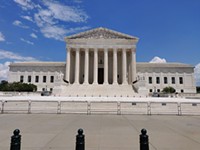Austin State Supported Living Center to Stay Open
Bill to close it dies before end of session
By Mary Tuma, Fri., June 5, 2015
After nearly a year of restless nights, Tammie Parker can finally sleep soundly again.
While at one point it seemed like a forgone conclusion, a bill that would have led to the eviction of roughly 200 local residents with intellectual and developmental disabilities – including Parker's 63-year-old sister – unexpectedly failed to pass Sunday at the hands of obstinate House and Senate negotiators. Following months of protesting and organizing against the proposed closure of the Austin State Supported Living Center, Parker and dozens of other guardians are overcome with relief, gratitude, and renewed faith in a system that, they say, could have jeopardized their loved ones' safety.
"We're all amazed. So many people told us it was going to happen and that there was nothing we could do, that the powers that be have spoken," said Parker. "But here we are, ecstatic that the closure is off, and reassured that our residents will be safe and secure. For the first time in as long as I can remember, I slept through the whole night."
The battle started more than a year ago. Last summer, the Sunset Advisory Commission recommended closure of the Austin SSLC, due largely to cost-saving reasons. The closure plan was rolled into SB 204, an overall Department of Aging and Disability Services restructuring bill, carried in the Senate by Juan "Chuy" Hinojosa, D-McAllen. SB 204 would have ensured the Austin SSLC's closure by 2017 and created a committee to determine how many and which of the other 12 SSLCs would close. Residents would be forced to transfer to another SSLC (away from family and support networks) or acclimate to community or group home settings.
Supporters of the closure say those community and group home settings are superior, and they also criticize the historic SSLC on West 35th Street, built in 1917, for lack of maintenance, and for past violations, which drew federal oversight. Yet many guardians – while keenly aware of the quality-of-service allegations – argue that putting residents in group home settings can endanger their lives and those around them, as several residents are prone to self-injury and intense behavioral problems (see "Evicted and Helpless," Sept. 19, 2014).
With tears, guardians watched SB 204 sail through the Senate in April, despite passionate objection from Sen. Kirk Watson, D-Austin, who expressed deep disappointment with the prospect of closure. "Simply closing this facility will not ensure safety, dignity, and respect for Texans living with intellectual and developmental disabilities. We fixed nothing," said Watson on the floor.
Its eventual passage into law seemed like a done deal. But on May 23, two House members shredded that inevitability of closure, granting renewed hope to guardians. Rep. Paul Workman, R-Austin, offered an amendment to delay the SSLC's closure to 2019 and to require DADS to draft a feasibility study to determine alternate uses for the SSLC, including combining its services with those of the Austin State Hospital. And a late-filed amendment by Rep. Susan King, R-Abilene, completely scrapped any mention of the SSLC's closure. That amended version overwhelmingly passed the House.
Still, the fate of the medically fragile residents came down to the wire. The weekend before sine die – the tail-end of the session – the modified legislation fell to House and Senate conference committee members (including Hinojosa, Workman, and King) tasked with hashing out the differences. According to a release from Workman, Hinojosa and other senators refused to accept the House changes and appeared willing to scuttle the entire bill if the closure amendment remained. "It is unfortunate that the parts of SB 204 that would have greatly benefited seniors and the disabled community – provisions I strongly supported – are left on the ash heap by a regrettable decision to not pass a good DADS Sunset bill," said Workman.
Negotiators were unable to reach an agreement Sunday. "I am disappointed that the House has refused to negotiate further to reach a compromise," said Hinojosa in a statement. "My concern is with the health and safety of these residents." Some guardians found the senator's words ironic, as they consider the bill's demise a guarantee of the health and safety of their loved ones.
The victory did not come without a long and drawn-out fight for families. For the past year, a small group of dedicated guardians helped spearhead a grassroots coalition that ballooned to roughly 100 activists (extending to family members, friends, neighbors, and others) who organized rallies against the closure and personally visited with lawmakers during the legislative session. "We are so grateful to the legislators who really studied the issue and realized the kind of care our loved ones need," said Nona Rogers, a key organizing leader and guardian of her brother, an SSLC resident diagnosed with Down syndrome and Alzheimer's. "We can all feel great relief now."
"We are taking a deep breath, finally," echoed Linda Johnson, guardian of her sister, who has lived at the Austin center for more than five decades. "This took so much out of us but it was so worth it. It was amazing to see how many people stepped up to defend us, even in the face of a lot of naysayers. Now, we want to continue the momentum to make things better at the SSLCs and bring more awareness to the general public." And for some, that momentum is still needed – while the threat of overall closure is gone (for now), last June, DADS, citing high overtime expenditures amid struggling employee recruitment and retainment, requested some 70 residents move out of the Austin SSLC; as of May, 61 residents have had to leave the place they call home.
Got something to say on the subject? Send a letter to the editor.









